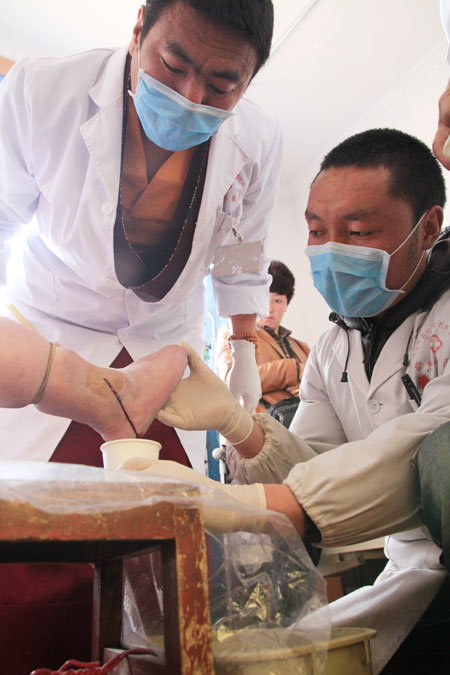Monk-doctors fill medical, spiritual needs
Updated: 2013-05-08 01:37
By Wang Huazhong and Palden Nyima in Lhasa (China Daily)
|
||||||||
 |
|
Tibetan monk-doctor Ngawang Thayi (left), 39, checks blood that was let out forcibly from a patient suffering from swollen feet caused by varicose veins. Wang Huazhong / China Daily |
'Comforting and patient'
Hanging on the walls of the clinic, which is at the foot of Drepung Monastery in the west suburb of Lhasa, are not only banners of thanks, but also a thangka, a delicate and pious Buddhism painting or embroidery on a piece of fine cloth that depicts Buddha.
The thangka described a mandala, displaying the model of the cosmic and people's inner world, with the Medicine Buddha residing in the center.
Right under the Medicine Buddha's sight, the monk-doctors received hundreds of patients per day.
Monk-doctors were called Lhaman, or divine and revered doctor, in the Tibetan language, by the 38th Tubo emperor, Trisong Detsen.
According to doctors at the clinic, every one of them had to spend more than 10 years learning and reciting Gyushi, or the Four Medical Tantras, as well as passing the State's examination for a practitioners' license.
Moreover, Gyushi demanded doctors have a kind heart and refrain from drinking, sleeping too much and gorging.
They also have to pray during drug making. In Drepung Monastery, about 20 high monks will gather to chant sutras, such as the sutra of the Medicine Buddha, for three days, as part of a ritual to pray for holy effectiveness of drugs that the monastery makes traditionally.
Due to the doctors' special status, people from all walks of life, especially those from pasturing and farming areas, visit them frequently.
Bang Tsering, 43, a Lhasa driver said, "It's more effective to get treated by a monk-doctor. I can describe my illness clearly to them."
Businessman Dekyi Droma, 35, from Qinghai province, who suffers lung disease, said, "I feel comfortable here because the doctors are more patient.
"It is cheaper too. They don't charge diagnosis fees."
Monk-doctor Ngawang Lhundrup, 62, who has practiced for 39 years, said, "It does not matter if most of the patients can cover the bill or not."
He said the clinic spends about 50,000 yuan ($8,120) a year providing free treatment to disadvantaged groups.
"We received Tibetans from the Amdo and Kham areas, Hans, Mongolians and even foreign tourists. We receive and charge them equally and prescribe Western or Eastern drugs according to their preference."
While practicing traditional bloodletting, the 60-square-meter clinic has also opened rooms for modern type-B ultrasonic scans and for injections and dripping.
The famous Drepung clinic received its operating license in 1996 to help people outside the monastery. Its revenues are transferred to the monastery to ease the government's and Buddhists' burden of supporting the monastery.
Eight medical staff members, including six monks and two nurses, work there.
They earn 1,600 yuan a month - nothing more than others, such as a cook, in the monastery.
Tseten Jigme, director of the Tibetan medical science and medicine literature research center under the Hospital of Tibetan Medical Science, said monk-doctors are good for society.
"On the one hand, monks can keep their personal religious practice undisturbed through curing people, which is accumulating good karma in Buddhism teaching. And on the other hand, they can benefit people."

 Michelle lays roses at site along Berlin Wall
Michelle lays roses at site along Berlin Wall
 Historic space lecture in Tiangong-1 commences
Historic space lecture in Tiangong-1 commences
 'Sopranos' Star James Gandolfini dead at 51
'Sopranos' Star James Gandolfini dead at 51
 UN: Number of refugees hits 18-year high
UN: Number of refugees hits 18-year high
 Slide: Jet exercises from aircraft carrier
Slide: Jet exercises from aircraft carrier
 Talks establish fishery hotline
Talks establish fishery hotline
 Foreign buyers eye Chinese drones
Foreign buyers eye Chinese drones
 UN chief hails China's peacekeepers
UN chief hails China's peacekeepers
Most Viewed
Editor's Picks

|

|

|

|

|

|
Today's Top News
Shenzhou X astronaut gives lecture today
US told to reassess duties on Chinese paper
Chinese seek greater share of satellite market
Russia rejects Obama's nuke cut proposal
US immigration bill sees Senate breakthrough
Brazilian cities revoke fare hikes
Moody's warns on China's local govt debt
Air quality in major cities drops in May
US Weekly

|

|







